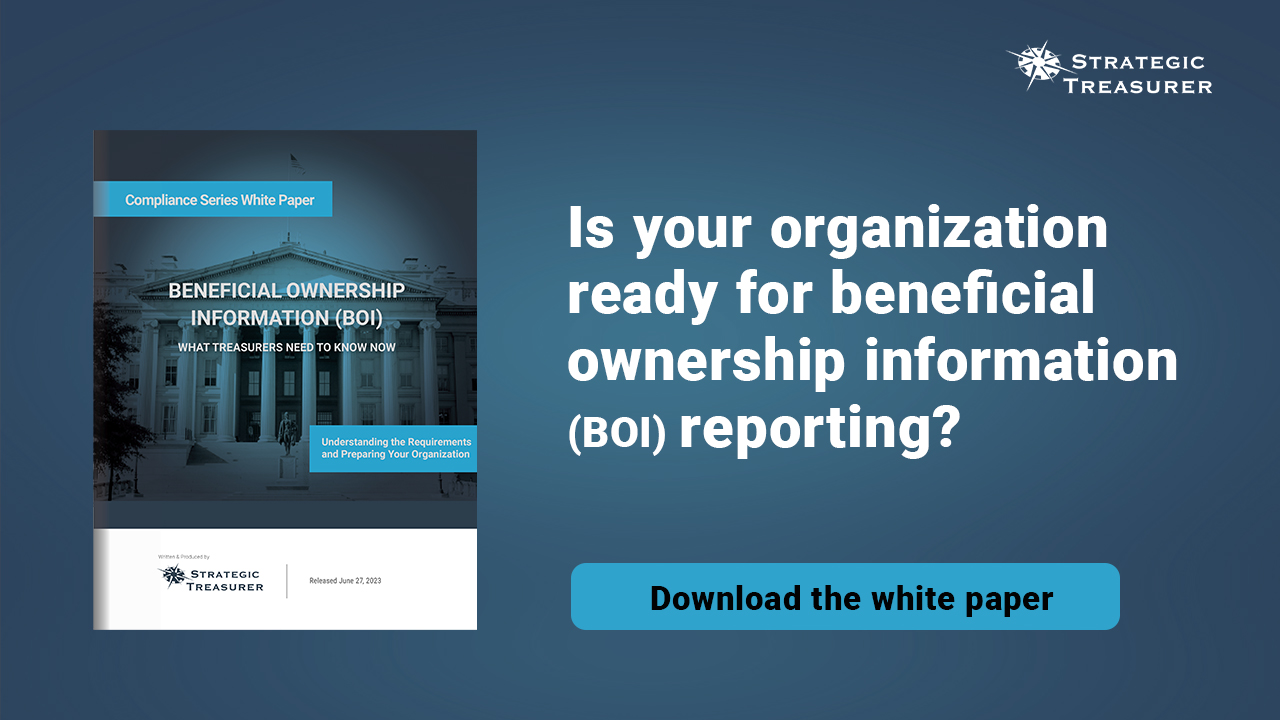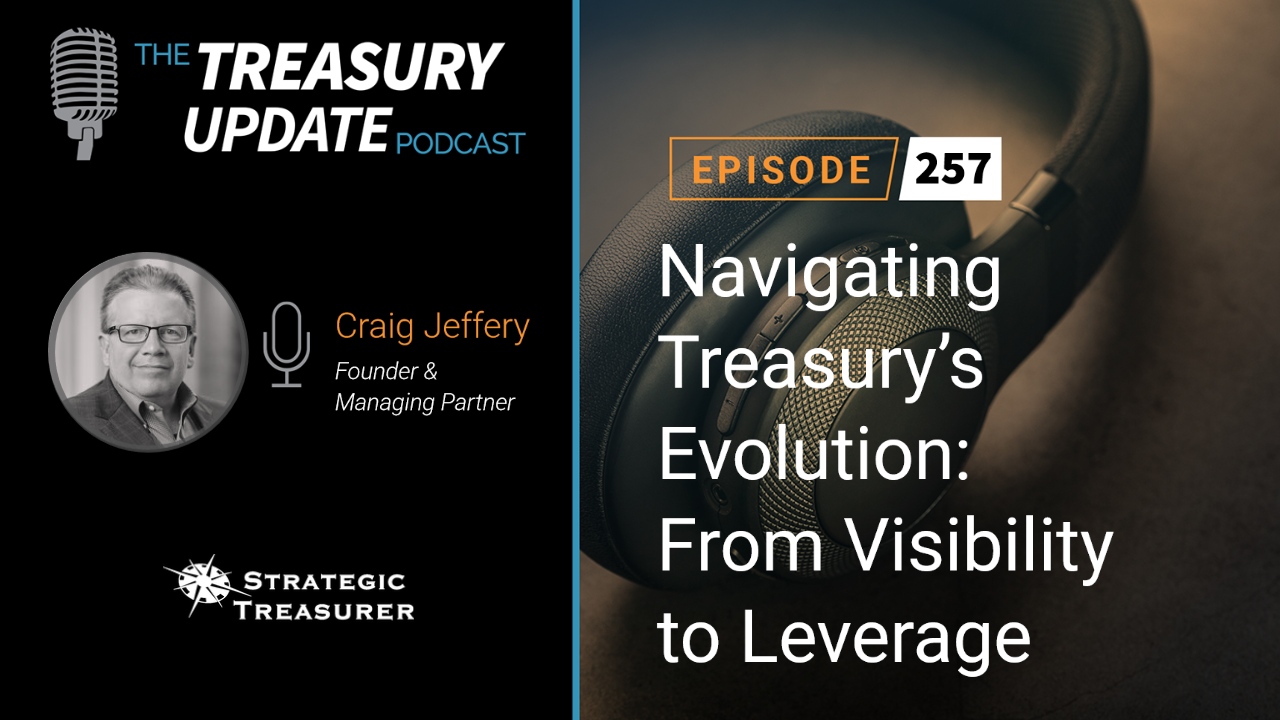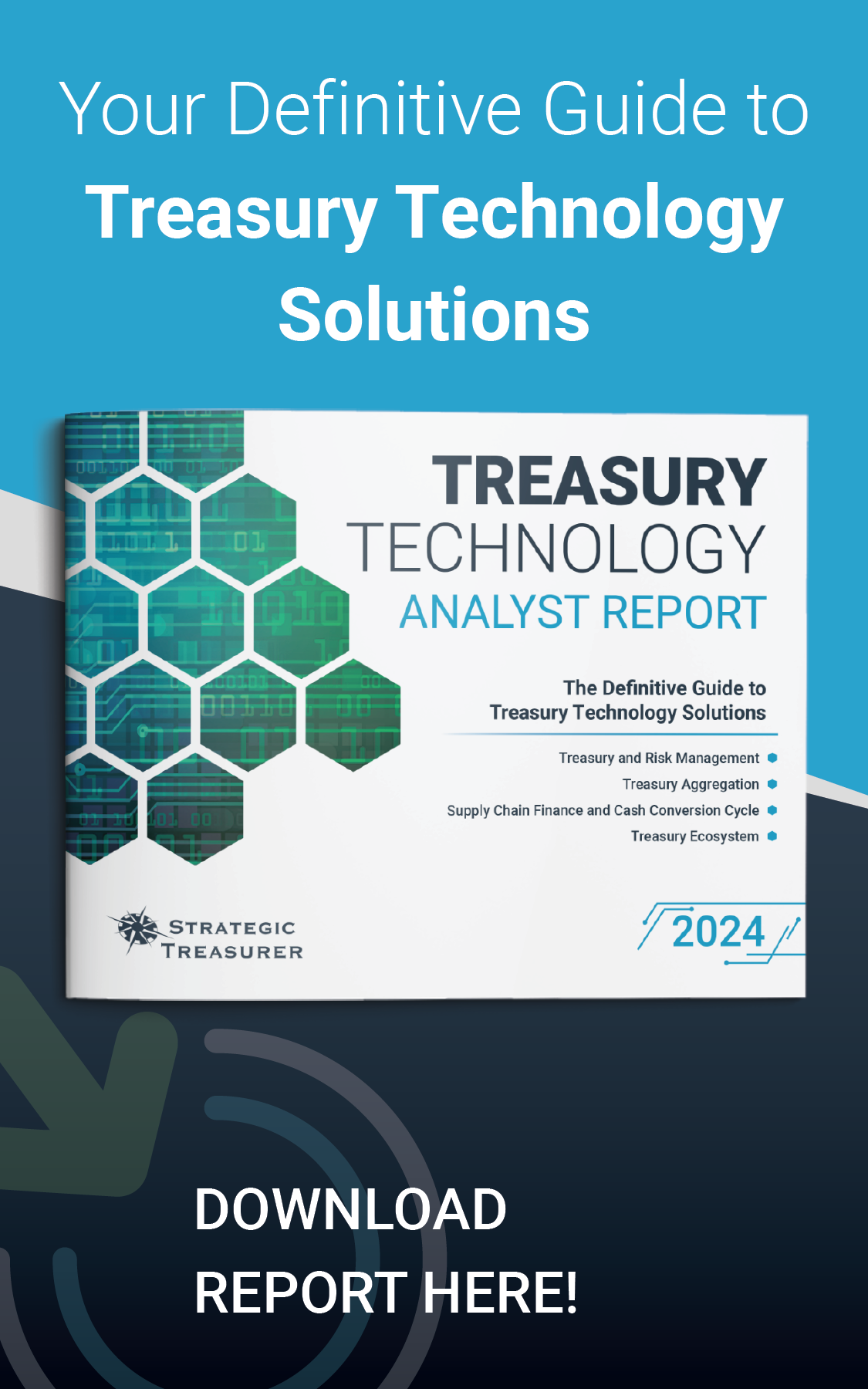
Episode 258
Navigating New Reporting Requirements and Financial Transparency: Beneficial Ownership Information Reporting (BOI)
Staying current with the reporting obligations is essential to avoid penalties and legal consequences. Today, we will hear from Craig Jeffery and Jason Campbell on Beneficial Ownership Information (BOI) reporting, a newly implemented reporting requirement that necessitates the disclosure of beneficial ownership interests. This filing is distinct from previous reporting obligations. Listen in and let us know your top thoughts and questions regarding BOI.
Host:
Jason Campbell, Strategic Treasurer


Speaker:
Craig Jeffery, Strategic Treasurer


Episode Transcription - Episode #258 - Navigating New Reporting Requirements and Financial Transparency: Beneficial Ownership Information Reporting (BOI)
Announcer 00:01
Before we jump into today’s podcasts on beneficial ownership information reporting, I’d like to let you know about our webinar on this subject on June 27, and 28th. You can find a link to the registration page in the show notes. Or if you’re listening to this after the 27th of June 2023, we’ve released our white paper on the subject. And that will also be linked in the show.
Announcer 00:23
Welcome to the Treasury Update Podcast presented by Strategic Treasurer, your source for interesting treasury news, analysis, and insights in your car, at the gym, or wherever you decide to tune in.
Jason Campbell 00:42
Welcome to the Treasury Update Podcast. My name is Jason Campbell, business development leader here at Strategic Treasurer. And I’m really excited about this topic, I think our audience is going to be engaged and probably listening and pretty good. Especially because it’s it’s kind of a newer topic than when we’ve done previously, or probably what many of our listeners may not even know a whole lot about. So it’s great. So talk with me today is our Managing Partner and founder of Strategic Treasurer. Craig Jeffery. Craig, welcome to the show.
Craig Jeffery 01:08
It’s good to be on and talking about regulations. Those are many people’s, you know, near near least favorite topic to cover. But yeah, I’m glad to cover these things with you, Jason.
Jason Campbell 01:19
Regulations. You know, I look at regulations as a, you know, it’s kind of like a box, as you will, right. In a box meaning and there’s there’s four lines of a boundary. And I think regulations are kind of always important to make sure that again, we got a spot check people, we got to make sure there’s things in place. So completely understand how that all kinds of, you know, kind of falls into place. And you know, and the other thing is, is with regulations, or regulatory somebody watching over you like a watch dog as you will you’re making sure that you don’t overstep, make sure it keeps you in line, make sure that you’re not going to do anything that’s going to potentially have some severe consequences. Because obviously, I don’t have anybody else but I don’t look good. And stripes and orange jumpsuits. So I’m trying to avoid that all possible. I’m sure many people are to really when we think about today’s subject, beneficial ownership, information reporting, it’s kind of new, there’s gonna probably be a lot more buzz towards the latter part of the year, because there’s a nice little deadline coming up with this. And it’ll be here sooner rather than than later. And that January 1 2024, deadline is going to be quickly approaching. So Craig, what I want to do is I want to turn to talk to you a little bit about this, we’ll call this acronym boy, BOI for short, because I’ll be honest with you beneficial ownership information reporting is a little tongue tying, so we’re gonna call it boy. So just kind of give us a rundown of what boy actually is.
Craig Jeffery 02:38
Sure. So beneficial ownership information reporting, is what we’re referring to as boy. And this is a requirement to report beneficial ownership interest to interest in particular companies. The background for this flows from the Corporate Transparency Act, or CTA. So, the goal is to make sure that there’s reported information on who are the beneficial owners of different entities. And this, you know, primarily relates to LLCs, partnerships, you might see that as joint ventures, etc. So it’s really designed for that. And the purpose of this is for the ability for law enforcement, NSA, this is a US regulation managed through FinCEN. It’s to I’ll read part of it’s to help prevent criminals, terrorists, proliferators, and corrupt oligarchs from hiding illicit money, or other property in the United States. So this is to pull it up, creates some sunshine for this. So it’s really providing a complete trail, or a significant trail for some of those organizations that can be hid under different company ownership structures. And so this, this, this will certainly impact greatly LLCs and, and some of the different organizations that exist that are smaller, and it will have an impact on corporations, many corporations will have some, some intersection with this rule and be required to report beneficial ownership information. And like you said, it’s due on January 1 2024. And so, you know, as we’re approaching summer of 2023, we need to be prepping for that make sure we have an inventory of what’s going on. So that’s really the the reason for this information. And so, this hiding money in the United States came about from we had foreign bank account reporting, and this was related to who can transfer money. And so this impacted, you know, foreign foreign subs, foreign entities, where there were some inter interface with US citizenship, either it’s owned by a US company or there’s a US tax paying entity, whether it’s a US citizen or a foreign national who has to pay US taxes, they’re required to report their ability to We’ll move on through either signer on account or acting with someone or on their own, they could they could move money. So this was all creating the trail of who can who can move funds for foreign bank account reporting, because that provides a good trail. If someone’s funneling money somewhere now, you can quickly roll up who did it and have that information? Especially even years later, if you find someone you can see, where did they have the ability to move money, beneficial ownership information reporting, for this long monologue that I’m giving you, Jason is that when there was a number of different kinds of payments being made through COVID, and through others, it became apparent that some of these entities that were getting benefits, and hiding money and being able to own these entities were benefiting from this, and then there was no way to necessarily see who were the beneficial owners. So this is a way of lowering the bar significantly by reporting this information. And, you know, in conversations with treasurer’s people across the Treasury space, very few know about this, hardly at all, a little bit more on the lawyer side, you know, corporate legal departments are hearing about this, from some of the origins, the some of the, the law organizations that are studying and see where this comes about. So this is important, it’s similar, in a lot of ways to f bar in its general approach, you know, different different purposes. One is who can move money, and who benefits from that, right? You might not, you might not be able to move any money, but you’re the beneficial owner, money can get moved to you. And now who benefits from it. So this is a way of, I’ll say, cleaning up the the ownership. And so this is for any way they can tie into it from for US organizations or entities, this reporting will be in place.
Jason Campbell 06:48
So yeah, so you know, it’s I think it’s always funny when we think about, you know, deadlines, you know, I, you know, it’s it’s that sense of urgency, and whether you’re a planner or procrastinator, like sometimes I’m a procrastinator, but never missed that deadline. But, you know, you definitely want to look at things it says there’s no reason to unnecessary stress is what I would kind of call it here, and especially when you have criminals out there, you know, who knows where, you know, they’re trying to hide their money. So criminals beware, because, you know, the regulators are coming down a little bit harder, they’re making sure that everything’s accounted for, it’s gonna be a little tougher to hide money in the mattress or the back yard or, you know, therefore, you know, maybe some other accounts somewhere that you’re trying to shift things offshoring or however you work at it. So, you know, I’d say criminals beware on this topic here. So first, let’s talk about, you know, kind of boy and f bar, right. So f bar being formed bank account, reporting, you know, is, is also kind of their cousins as you will, right. So necessarily, you know, from the same lineage, but directly, but obviously, they’re in some type of comparable form. So we’ll just call them cousins for the sake of this topic here. And let’s hear from Hezekiah about one of our premier services about FBAR filing.
08:04
Are you fed up with the complex and time consuming compliance demands of foreign bank and financial accounts reporting? Leave the hassle behind and let Strategic Treasurer ease your filing stress. Our experienced team specializes in understanding and navigating the intricate FBAR requirements, from gathering essential information to preparing and submitting the mandated forms, we remove the headaches while keeping you in full compliance. Contact us today to simplify your FBAR obligations, so you can focus on what matters most to your business. Send an email to fbar@strategictreasurer.com.
Jason Campbell 08:45
So Craig, now going back to you here. So let’s go into talking a little bit about why does this regulation even exist?
Craig Jeffery 08:51
Well, for the fact that there’s been regulated entities, oligarchs, others who have hid funds in the United States through different entities, and have benefited from some of these different programs that have existed for US companies and US citizens and US employees. So this is a this is a reaction to that to stop illicit funds to stop terrorism. Terrorism is obviously funded up by money. And this is just another way to throttle that down. And so here’s one way that they’re trying to close another gap that they’ve seen.
Jason Campbell 09:25
And so which which obviously, you know, from a terrorist and you know, how to stop crime and criminal activity itself and you know, that’s where regulation goes into place, right. And that’s usually have laws in place to stop criminal activity. So so it makes sense in the in the reason why this is come about and the ways to find things in the domestic side of things. So what do organizations or what do we have to do to ensure that we are in compliance?
Craig Jeffery 09:51
The final rule was completed on September 30. But there’s certainly more information that’s coming out like the the what’s in scope and what’s not in scope, like what type of entity Certain scoping audit scope, it’s a pretty large list of what’s not in scope. And you can say, Oh, we don’t have any of these, or maybe we do, or I don’t think we do. So the first issue considering we’re, you know, we’re talking in the June, June 2023 timeframe, you’re looking at what is our complete list of entities that we own or have ownership in? Or have responsibility for. So what So what’s necessary full inventory of all legal entities, which ones are subject to it? Which ones might be subject to it, which ones are not? That makes perfect sense that you can narrow it down to say, what, what can be included here. And then it would be to capture the information for probably both categories, those the ones that are definitely included, those ones, you may not be sure of right now, to proceed, gathering that type of information. And then, you know, as more information comes out, finalizing those ones that may be a bit iffy, to your organization, maybe does this does this joint venture work? Does this standalone LLC, work for this particular entity, or not. And so all of those will require an evaluation. So some firms will say, if you’re in real estate, you may have many, many LLCs that exist that are, you know, all standalone, or maybe there’s certain roll up structures that that exist, you have to look through those and see what makes sense. So on this short podcast, I’m gonna try to say which ones are in which ones are out, I think there’s still some evaluation, there’s still a few areas that are gray. But it’s essential, during the summer, at least, to go through and do a complete inventory of what these items entities that may be included or will be included, as are capturing that information, finding a home for it, capturing and capturing it securely. Because it’s because it’s so crucial. So that’s that’s the first step, then there’s the issue of how do you file it? When do you file it? And the timing?
Jason Campbell 11:56
It’s interesting is I’m pretty sure there were some aha moments to our listeners out there going, you know, and you brought up some good points about you know, was last time we really kind of checked our organizational structure, you know, and do things make sense? And do we have like, you’re talking about real estate and properties and, and, you know, whether they’re an LLC isn’t doesn’t make sense, as a structure still makes sense. So I’m all about health checks, and kind of getting a pulse check of it take stock take inventory of what you do have, and is it you know, is it all in the correct ways in the correct format? And especially, because obviously, the better that these pieces are these components of your business structure and an alignment, the easier is those processes going to be? And I think, really, you know, it’s also to from an education perspective, and just, you know, after you’re getting that clean up, right, it’s just learning those those next steps, because obviously, this is regulation is going to happen for years to come. And it shouldn’t be a surprise, it’s a fair warning, it’s, you know, it’s it’s seven months away. And I know that strategic treasure, we’re hosting a wonderful webinar coming up in June, as well as talking about, you know, f bar and boy itself. So there’ll be some great information for our listeners. So there’s time to, to go ahead and sign up for those webinars and participate. But also too, as well, again, because it’s all about getting information. And the more that you have, the more that you’re prepared, the better you are being able to deliver and ensuring that things go off without a hiccup or any type of bump in the road. So sick. I know we’ve kind of gotten into talking a lot about you know, the the deadlines or devastate deadlines, but more like the due dates and stuff. But let’s talk let’s go back through and revisit what is the timing of all of this?
Craig Jeffery 13:28
This is really important information. And it’s I find it a little bit confusing if you don’t write it on a piece of paper. So are you set up a new entity are registering an entity, or has this been this entity been in place, if the entity has been in place, or registered by December 31 2023, then you have until January 1 of 2025, to do the filings. So you have right now you have about up to 19 months to the filing for existing entities, you will want to capture this information that summer, you will want to get all that information. So you can file sometime during 2024 For existing entities, new entities, new entities, once you get notification that your registration has gone into effect or the entity has been created, you have 30 days to put that in place. So let’s say seven entity on January 1, on January 30, you’d need to file they get you get the information, the notification that it set up then you have to file by the end of January 2024. So those are those are two of the deadlines. So I would say the other aspect of a deadline is making sure that you have all your evaluation of the entities done ahead of time, and then you’re capturing that information.
Jason Campbell 14:48
So even though even though this this this regulation kicks in on January 1 Nicely due day is is more of an activation day. But the seven months that we’ve already previously discussed is leading up to it say Hey, ack now not put it on the back burner, because at some point, regardless, you’re gonna have to do it is always better to do sooner rather than later and have this headache setting up, you know, this dark cloud of this new regulation sitting in, you know, over your head, it’s probably better for a lot of folks just go ahead and get in front of themselves and be able to go ahead or steps to take to go ahead and clean it probably has to happen anyway. Right? So it’s probably something else to have that good spot check of knowing that your entities are sitting in the right place. It’s it’s, it’s knowing who’s doing what the ownership pieces, everything about getting everything laid out and prepared now. So it’s not something that you have to worry about when it is actually time. Is that fair to say?
Craig Jeffery 15:39
I think that’s I think that’s good. I mean, I would, I would say, you know, you may not know how much work you might have to do. But the first step in doing that evaluation, I’ll say, we have 305 entities, okay, so you go through the, the inventory, and you determine, Okay, 40, these may be subject to it 2020 I think our 20 may or may not be and you go through the process. Okay, this is our universe of what we have to focus on. Now, now we’ve limited how much goes on? So what do we do to capture that information to capture the four key pieces of information, the scan of identification? And then how are we going to do the FISA, how is that filing going to work. And then the other the other processes, you need to set the process up no later than the end of this year to capture company applicant information. Because when things get set up, in 2024, you have to file within 30 days. So you have to have a process in place before you start or as you start 2024. So those are just some of the dates to be thinking of?
Jason Campbell 16:42
Well, and obviously, it’d be an all new process, you know, like you said, it’s, it’s always good to have you know, avenues where you can go to get as much information and be prepared and be ready, right? So always. So you want to be ready before the storm and having all of the your supplies ready to go right and just treat it no different here and this aspect with this new regulation. So I know that we talked about things that we need to do now we talked about reviewing entities we talked about, you know, standalones. And so I just want to see if there was any other pieces that you want to add of things that can help our listeners be prepared for this regulation to come into effect outside of those two key items we’ve already discussed.
Craig Jeffery 17:20
Yes, I’d say just some of the terms that you’ll become more familiar with when something’s new, it’s always like, Wait, what are the terms? What do they mean, what’s included, what’s not. And we can quickly factor things in our head or come up with ideas in our head of this is how it works, or this is how it doesn’t work. And some of those can be wrong. So gathering that information is vital, but also understanding the terms and reading through a bit of this content is going to be crucial for organizations. And this may this may land more in the domain of legal than treasury. But treasury, I think can play a significant part in this especially because they’re usually involved in foreign bank account reporting. Whereas foreign bank account reporting is either Treasury or tax tends to be responsible for this, I would say that, you know, for beneficial ownership, information reporting, that’s going to be legal, or Treasury or a combination of the two. But just a couple of terms, reporting companies, there’s there’s reporting companies, beneficial owners, and we have to also come up with a term company applicant. So I’ll just go through those real briefly, this is easier to read material on it than it is to talk about it, Jason. But there’s two types of reporting companies as they define it. And those two types are domestic and foreign. So pretty easy to see the difference, right. And so it’s, you know, if it’s domestic, it’s you filed with the secretary of state, like I said, it could be Indian tribe, or secretary of state that would cover all the domestic items. So it’s us, us base anything, foreign reporting companies foreign for the perspective of the US. So any other foreign country that’s registered to do business, somewhere in the United States, or, you know, Indian tribe area, so all of those entities, wherever they’re doing business with in the United States would count to those would be foreign, and the other be domestic. So that’s the two reporting companies, and there’s quite a bit behind that. But just think about reporting company. So it’s the entities that we’re talking about. The second is beneficial owners. And this is there’s a couple different rules about that, and what’s what’s substantial control and who has, you know, or owns or controls at least 25% of the ownership interest, that the two tests are one either if either of these work Europe, you’re considered beneficial owner, you have substantial control over the reporting company, run ins business making decisions, it could even be moving funds, right? That would be considered some type of control, or you own or control at least 25% of the organization is considered ownership interest of the reporting company. And so there’s there’s there’s a more refined and define definition of substantial control and ownership of interest. And so I’ll leave that one at that. And then we’ll just move on to the company applicants, if if you want to hear about that, though, that’s the last part, like who’s filing to create an entity. Now, it’s kind of interesting in this, you know, it’s not, there’s no ex post facto, you know, after the fact, you don’t have to go back and say, who did all of this historically, so anybody who had an existing or registered company, you know, as of the effective date, so January 1 2024, ostensibly, you don’t have to go back and do this identification, any new companies will have to capture this information. So part of the process of setting up entities now needs to include the checklist, you know, filing company applicants, for boy, for the beneficial ownership, information reports. And so the two company applicant persons are the individual who files a document to create the entity registers the entity to do business, the United States, those are the ones that count, right. So if you’re, let’s say you register in Germany, but then you you file or register in the United States do business, the person who does that is a person that that would be the company applicant, person who files in the United States, the person who registers entity do business in the US from outside the United States. And the other is the individual is primarily responsible for directing or controlling the filing of the relevant document by another. So just because you control it, but you don’t do the filing, you still are a company applicant. So it’s who’s doing it, and who directs it. So those are the two particular requirements.
Jason Campbell 21:44
So Craig, I know that we talked about, again, some, you had mentioned it previously about some key responsible people within an organization that’s gonna be responsible for the BOI regulation. And if you don’t mind, let’s just talk for our listeners. Again, just keep it top of mind here, who, who essentially is responsible for BOI, in companies?
Craig Jeffery 22:05
Most organizations legal is going to have a key driver on this, because they’re the ones that are controlling the legal entity hierarchy, tax may have an influence on what entities are set up. Treasury is going to be reporting and handling the accounts. So those those three other ones that are going to be involved in it, I would say for most organizations, ensuring that there’s compliance from a process perspective, at least setting it up is going to be legal, I would say Treasury would be most, most likely the next area. And they may, in many cases, be responsible for doing this filing, if they’re already doing things like f bar filing reporting, they get add this information and push it in, push it into the new FinCEN system for this. Either way. I mean, that’s something I mean, just for our listeners to know we we do foreign bank account reporting and bank account management for companies handle all the filing there, we will be doing boy reporting as well. And so this is, you know, these are things that your law group will do, your treasury group will use an outside provider like either an outside law firm, or firm like Strategic Treasurer to do this.
Jason Campbell 23:13
So obviously, this this concept, this regulation, here is a little it’s fairly new for for many folks, I’m sure a lot of people are wanting to know, how do I get more information? Where do I go, and there’s different avenues for organizations to help, you know, get that information. And to help with the reporting requirements. One of the great things that we do have is we have a great webinar that folks are more than welcome to attend by going to StrategicTreasurer.com. And also look in the show notes, you’ll be able to find a link to our June 27 and 28th webinar, specifically talking about FBAR and BOI filing. So really excited to be a part of that with Craig, you and I are going to be providing some exceptional information during those webinars. And so please join us for one of those. Craig, thank you so much for being with us today. We really appreciate it as always, and to our listeners. Thank you so much for tuning in to this episode of the Treasury Update Podcast. And until next time, take care.
Announcer 24:11
You’ve reached the end of another episode of the Treasury Update Podcast. Be sure to follow Strategic Treasurer on LinkedIn. Just search for Strategic Treasurer. This podcast is provided for informational purposes only, and statements made by Strategic Treasurer LLC on this podcast are not intended as legal, business, consulting, or tax advice. For more information visit and bookmark StrategicTreasurer.com.
Subscribe to the Treasury Update Podcast on your favorite app!
Related Resources
BOI: What Treasurers Need to Know
This white paper provides an overview of the Final Rule, which companies need to report, what information must be reported, upcoming deadlines, and estimated time for filing. View this white paper for more info!
Navigating Treasury’s Evolution: From Visibility to Leverage In this podcast, Craig Jeffery and Jason Campbell from Strategic Treasurer discuss key elements, the right mindset, and a roadmap for help your treasury team excel. They discuss building the right team, leveraging technology, and establishing effective structures. Equipping your team with the right warning signs and signals is vital, but developing the ability to read and react to these indicators is equally important. Listen in as Craig and Jason unpack this!








